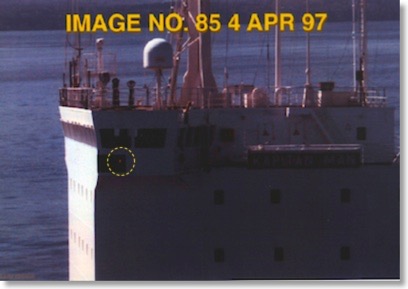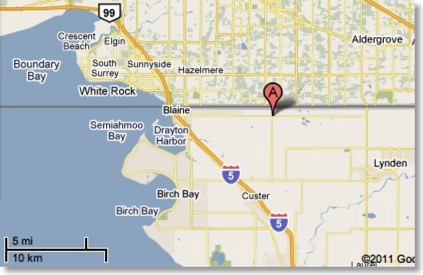Home
A comprehensive resource for safe and responsible laser use
US: Man shines laser near Sea-Tac Airport and at police helicopter: "Didn't think it was a big deal"
On March 13 2018, the Sea-Tac control tower notified the helicopter, Guardian 1, that a laser was being aimed at inbound aircraft. The approximate location was the Burien Transit Center bus station. The helicopter was able to locate a man, who pointed a green laser beam at the aircraft. Officers on the ground arrested the man, who was not named in press reports.
According to the arresting officers, the man said he was showing his friend a new laser, and the man was “accidentally” aiming near the airport. The man also said he deliberately aimed the laser at the helicopter but “didn’t think it was a big deal.”
The laser caused a brief interruption of SeaTac Airport flight duties and prevented pilots from looking outside the aircraft.
From the Sky Valley Chronicle, KIRO, and Q13FOX.
US: DOD confirms eye injury to copter passenger; perhaps from Russian vessel Kapitan Man?
Coast Guard and Navy personnel boarded the vessel on April 7 but were unable to find any laser device, or evidence of a possible device. U.S. Navy Lt. Cmdr. Jack Daly was then examined by military laser eye injury experts, who found “there was a high probability that the minor burns on the lieutenant's right retina were caused by multiple laser exposures such as might result from a single glimpse at a repetitive pulsed laser.”

The American naval officer took this photo in the Strait of Juan de Fuca showing a red light on the M/V Kapitan Man. The light led some to suspect a laser. However, subsequent inspection did not find a laser, and in the location of the red light were “two deep red running lights … that met the guidelines established for sidelights.”
The U.S. Defense Department concluded that “[a]vailable evidence does not indicate…what the source of such an exposure might have been. Specifically, there is no physical evidence tying the eye injury of the American officer to a laser located on the Russian merchant vessel.”
The Strait of Juan de Fuca laser incident was also discussed in the August 2004 medical journal Archives of Ophthalmology. The article “Assessment of Alleged Retinal Laser Injuries” describes “Case 5” and concludes that “…[n]o evidence of laser injury was found in the years after the incident by 17 other ophthalmologists, including 5 neuro-ophthalmalogists and 8 retina specialists. A trial was held 5 years after the incident in which the retina specialist who made the initial diagnosis steadfastly maintained all the photographer’s [naval officer’s] symptoms were due to retinal laser injury. A jury ruled against the photographer’s claim for damages against the ship’s owner.… The patient had real complaints, but they were caused by preexisting autoimmune problems rather than by laser injury.”
The full text of the DOD press release, and the “Case 5” study is below (click the “Read More…” link). Additional information above is from a 2011 Washington Times story.
US: Jurors find spotlight misuser guilty on one charge, not guilty on another
On April 28 2011 the jury found Wayne P. Groen, 42, guilty of incapacitation of an individual during authorized operation of an aircraft. The jury found him not guilty of interfering with the authorized operation of an aircraft. Sentencing was set for August 4 2011.
Groen lives near Lynden, Washington about 1/2 mile south of the U.S.-Canada border. According to the Seattle Times, Groen said he aimed the spotlight at the Border Protection helicopter because he was “curious” about their activities, bothered by the noise, and “wanted to alert the pilots as to how close they were to his home.”

Groen lives on H Street Road, which parallels the U.S.-Canada border
The Bellingham Herald reports that some of Groen’s neighbors have been annoyed by Border Protection activities, such as frequent low-level helicopter flights and vehicles traveling through their yards and fields. They “have been tempted” to spotlight helicopters, and felt that threat of a long prison term (up to 40 years) for Groen was excessive. One man quoted by the paper said he was in an old barn at night when a helicopter hovered overhead and the metal roof began to rattle and shake: “Had I had a good flashlight I would have shined it up at that black object to see what it was.”
From the Seattle Times and the Bellingham Herald. An account of the opening day of the trial, entitled “Light v. helicopter -- who felt threatened most?” can be read after registering at the Lynden Tribune; a cached version is available at Google.
UPDATE August 4 2011: Wayne Groen was sentenced to two months in prison, 90 days of home detention, 120 hours of community service, three years of community supervision, and a $5,000 fine for incapacitating an individual during the authorized operation of an aircraft. Groen could have received up to 20 years in prison. The prosecution recommended 10 months; the defense wanted no prison time, one year of probation, 120 hours of community service and a $5,000 fine. From The News Tribune
US: NFL team Seattle Seahawks plane hit by laser
According to the Federal Aviation Administration, the plane was about 2 miles from the runway when it was hit. The incident was reported to local police.
As of January 19, no suspect has been identified.
From SB Nation and the Seattle Post-Intelligencer.
US: 12 planes report a laser in Seattle. UPDATE: Arrest made
All the planes were targeted during a 20-minute period Sunday night, and all landed safely. But the incident led to pilots simultaneously trying to avoid being temporarily blinded by the light while trying to help authorities pinpoint its source, believed to be about a mile north of the airport.
Air traffic controllers continuously cautioned pilots about the light during the episode, which lasted from 7:10 to 7:30 p.m. PT.
A pilot reported the source to be a block and a half west of an interstate. Airport authorities said they conducted two searches of the area but did not find the culprit.
Officials note that it is a federal crime to point a laser light at an aircraft, and pilots are required to report encounters with laser lights. Officials fear that the lights could cause an accident by blinding pilots or otherwise affecting their night vision.
The FBI has “made it a priority” to investigate laser incidents, according to CNN reporter Jeanne Meserve.. MSNBC reports that the Transportation Safety Administration is also involved in the investigation.
Additional details from CNN and MSNBC. A CNN video of the news story “Lasers aimed at planes”, reported by Jeanne Meserve, is also available from CNN’s website. The video adds information on the FBI which is not in the website print version.
UPDATE: On March 6 2009, police arrested Christopher C. Saunders on the felony charge of first-degree unlawful discharge of a laser. His apartment is in Burien, near the area where the lasers originated. According to the Seattle Times, Saunders told police he was “pointing the light in multiple directions outside a party and may have layered a plane.” From KOMOnews and the Seattle Times.
UPDATE #2: A March 25 2009 AP story stated that Saunders had been released with no charges filed against him. The story also noted that a laser was aimed at an Alaska Airlines flight landing at Seattle-Tacoma International Airport. The source of the laser was “near the source of previous laser reports.” From SignOnSanDiego quoting KOMO television.
.